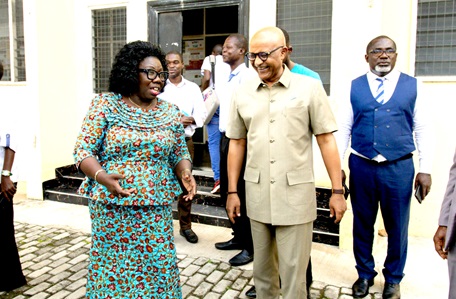Nadequate water supply, health facilities and difficult access to education in island communities in the Eastern Region have led to children in those areas trekking long distances to access these facilities, UNICEF Ghana has said.
It said the poor access to those facilities was a direct cause of the high attrition of key workers who delivered vital services, resulting in adverse results in education, health and birth registration.
It noted that weak implementation of birth registration protocols and the charges associated with children over 12 months were major drawbacks to achieving universal birth registration.
These were part of key findings from a week-long visit to island communities in the Eastern Region to address child vulnerabilities by the UNICEF Ghana Representative, Osama Makkawi Khogali.
The visit, which marked the first time a head of a development organisation in Ghana had undertaken such an extensive and direct engagement with hard-to-reach communities, saw Mr Khogali travelling by ferry, canoe, and motor bicycle to two communities in the Kwahu Afram Plains South, namely Bumpata and Ekyiamenfrom, and remote fishing villages of Kpatalidzakope and Senafukope in the Kwahu Afram Plains North, to engage directly with the residents.
Objective
The objective of the visit was to gain an understanding of the pressing challenges impacting children in those communities, including significant barriers to birth registration, access to education, health, and adolescent and child protection issues.
![]()
Osama Makkawi Khogali, UNICEF Representataive in Ghana, with a child from Kpatalidzakope, Island Community
A statement issued in Accra after the visit said the Eastern Region, while showing progress in some health indicators, continued to present significant challenges for child well-being, particularly in its rural and hard-to-reach areas.
Regarding birth registration, it said, “a significant hurdle exists in rural areas, with 73 per cent of residential clusters lacking health facilities, which are often the primary points for birth registration.
This directly impacts a child's legal identity and access to essential services”.
For education, it said, the significant lack of access contributed to lowering school attendance and retention rates, disproportionately affecting girls.
“Despite improvements in maternal and neonatal mortality rates, malnutrition remains a concern.
A study in the Denkyembour District highlighted that 15.2 per cent of school-going children suffered from thinness, and 17.8 per cent experienced stunting, influenced by parental education levels and household food insecurity,” it said about health and nutrition.
Visit
Touching on the visit, the statement said, it was a direct reflection of UNICEF's dedication alongside that of the government and partners to reach marginalised communities across Ghana, ensuring every child had the opportunity to survive, thrive, and reach their full potential.
![]()
Osama Makkawi Khogali (right), UNICEF Representative, interacting with a teacher from Bumpata DA Basic School, Afram Plains
It said during the visit, Mr Khogali held constructive dialogues with the Regional Coordinating Council, District Chief Executives, community members and their leaders, teachers, health workers, and religious leaders, and the key discussions centred on challenges hindering birth registration, barriers to accessing quality education, availability of essential health commodities and adolescent pregnancy.
“UNICEF’s presence in these remote communities reaffirms our core principle to protect and promote the rights of every child irrespective of where they live, however isolated," the statement said.
![]()
Osama Makkawi Khogali (5th from left) with some members of the Eastern Regional Coodinating Council
It said understanding the unique barriers children faced in accessing quality education and essential health services, to addressing concerns around adolescent pregnancy and birth registration, were crucial for tailoring support effectively, adding that the visit strengthened their resolve to ensure that no child in Ghana was left behind.
About UNICEF
UNICEF is the world’s leading child rights organisation, working in over 190 countries and territories to reach every child, everywhere.

